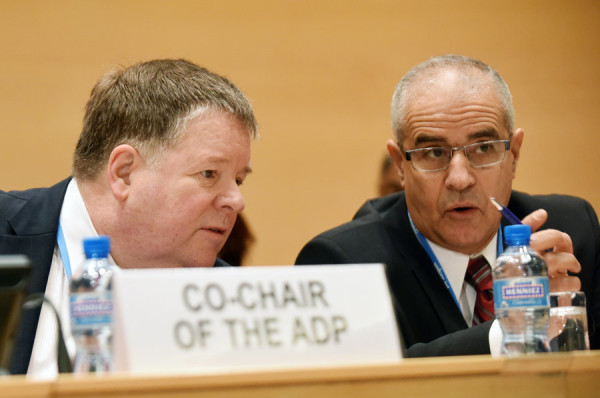The latest round of UN climate change negotiations ended on Friday in Bonn, Germany, on track to produce the first comprehensive draft of the new, universal climate change agreement that governments are committed to reach in Paris, in December.

The draft, to be drawn up by Ahmed Djoghlaf of Algeria and Daniel Reifsnyder of the United States, will present clear options and ways forward on all elements of the agreement and the decisions that will operationalise it from 2020.
“At this session, countries have crystalised their positions and have requested the Co-Chairs to produce a concise basis for negotiations with clear options for the next negotiating session in October. This means that we will arrive in Paris on time without too much turbulence – not before, not later,” said Mr Djoghlaf, Co-Chair of the ADP, the negotiating body tasked with reaching the agreement that must put the world on a path to stay beneath a 2 degree Celsius temperature rise.
“What Parties are looking for now is a better basis from which to negotiate. This week, we achieved an enormous amount of clarity as to where we are going which makes this possible and allows us to speed up,” said Co-Chair Daniel Reifsnyder.
Mr Djoghlaf said they will deliver the basis for the negotiations of the Paris climate package the first week of October, well in advance of the next ADP meeting in Bonn, Germany from 19-23 October.
Mr Reifsnyder said that this meant that all Parties to the UN Framework Convention on Climate Change (UNFCCC) will be able to negotiate the Paris package in a single drafting committee.
“In October, countries will continue their important work, basing their negotiations on a clear, consistent, comprehensive, and coherent draft of the agreement and its accompanying decisions. They will get it in shape and ready for successful completion in Paris,” he added.
The document will retain sets of options reflecting the different views and positions where governments still need to agree common landing zones.
Laurence Tubiana, Special Climate Envoy for the Government of France, said: “At this session, countries have clarified all the different pieces of the puzzle. Now, all pieces of the puzzle will be assembled and this will enable the negotiations to pick up pace.”
Assembling the puzzle will provide countries with the overview of options that they need for the final steps towards the new agreement.
“I am very encouraged,” said UNFCCC Executive Secretary Christiana Figueres. “This session has yet again proven that all countries are moving in the direction of progress and all agree that Paris is the final destination for the new universal agreement.”
The October meeting is the final scheduled session of the ADP (Ad-hoc Working Group on the Durban Platform for Enhanced Action) before the December conference.
But the ACT Alliance has said that the Bonn climate negotiations have not made significant progress towards the anticipated climate change agreement in Paris in December.
The international humanitarian and development network said that while negotiators from many countries participated with a good exchange of ideas on the different elements of the draft text under negotiation, the general slow pace meant that very little advanced into substantive negotiations.
“The sense of urgency required in view of the few months remaining before Paris in December, was simply not there,” said Mattias Söderberg, chair of the ACT Alliance advisory group on climate change advocacy, who led the alliance delegation that attended the talks. “We cannot afford to delay the process, because the consequences would be unbearable for the efforts towards climate action. Therefore we keep calling on governments to step up and use the next – and final – session of negotiations in October meaningfully.”
ACT Alliance is a network of over 140 church and faith based organisations working together in 140 countries to achieve sustainable change in the lives of people affected by crisis, disasters, poverty and injustice.
Söderberg highlighted that some progress has been achieved in the negotiations relating to loss and damage and applauded this, stating: “We hope the governments will find a way to include it as part of the Paris agreement.”
However, he added: “We expected more progress in this session considering that parties had a text which had been prepared by the co-chairs in good time. Having followed these meetings we see no credible justification for the delays and lack of meaningful steps forward. Now, we can only hope that previous failures in the UN talks, similar to what we saw in Copenhagen 2009, will not be repeated.”
The Climate Action Network (CAN) International observed that, in Bonn, negotiators grappled with the new tool produced by the co-chairs to guide negotiations. The group stressed that, while not obviously apparent in the text, there was a new willingness by countries to more openly discuss potential roadblock issues in detail like loss and damage, differentiation, finance, and a mechanism to scale up action in the years to come.
On the ground in Bonn, CAN members made the following comments:
Jasper Inventor, Greenpeace, said: “The clock is ticking, and country negotiators cannot just sit and wait until October. They need to find compromises on the key outstanding issues between now and the start of the next session. We need a better mutual understanding than they currently have – ready to build a Paris agreement together that can deliver the action needed for a climate safe future.”
Mohamed Adow, Christian Aid, noted: “It’s getting very clear that we will get a deal in Paris. The question now is what kind of a deal we are going to get – whether that deal will be a good deal. Right now, the country commitments won’t keep us under 2°C, much less 1.5°C. A good deal will to create a framework for countries to continually increase their ambition, protect the most vulnerable, and prevent catastrophic climate change. This means the deal needs to provide support for poor countries to adapt and develop on a low-carbon path.”
